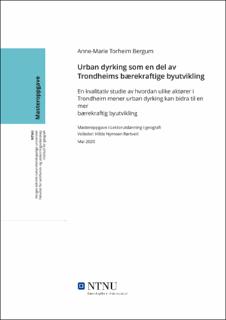Urban dyrking som en del av Trondheims bærekraftige byutvikling
Master thesis
Permanent lenke
https://hdl.handle.net/11250/2785186Utgivelsesdato
2020Metadata
Vis full innførselSamlinger
- Institutt for geografi [1022]
Sammendrag
Globalt har urban dyrking opplevd en økt popularitet de siste årene, også i Trondheim. Dette er en trend som har oppstått samtidig som man har opplevd et økt fokus på hvilken påvirkning menneskets livsstil har på jordas naturmiljø. Denne studien ser nærmere på hvordan ulike aktører i Trondheim mener urban dyrking kan bidra til en mer bærekraftig byutvikling. I forbindelse med dette etterspør studien aktørenes motivasjon for å engasjere seg i dyrking, og reflekterer over hvilket potensiale det ligger i urbane dyrkingsprosjekt dersom man har optimal tilrettelegging. Oppgaven bygger på kvalitative intervju med aktører som på ulike måter er involvert i urbane dyrkingsprosjekt i Trondheim.
Empirien diskuteres opp mot et teorigrunnlag som tar for seg ulike perspektiver på den bærekraftige byen og teorier om hvordan urban dyrking kan bidra til økonomi, samfunn og naturmiljø. Per dags dato er arbeidet med urban dyrking underlagt Miljøenheten og sektoren for forbruk og avfall i Kommunedelplan: energi og klima 2017-2030. Kommunens intensjon bak tilskuddsordningen er å fremme miljøvennlige forbruksvaner og legge til rette for økt livskvalitet og samhold i lokalsamfunn. Dyrkernes motivasjon viser et mer nyansert perspektiv som kan forstås gjennom begrepet «wellbeing» og et ønske om en mer miljøbevisst samfunns- og byutvikling. Oppsummert snakker informantene om hagene som steder for matproduksjon, kunnskapsformidling, bevisstgjøring av sosio-økologiske relasjoner, habitat for planter og dyr, handlingskraft, rekreasjon, trivsel, nettverksbygging, og estetiske og gode møteplasser i lokalsamfunnet. I tillegg påpekes det at urban dyrking kan integreres i allerede eksisterende infrastruktur, bidra til å gjøre Trondheim selvstendig med tanke på matproduksjon og redusere byens klimagassutslipp.
Basert på studiens funn ser det ut til at det er betydelig potensiale i urban dyrking i lys av en bærekraftig byutvikling, noe som må løftes frem til både politikere og utbyggere. Urbane dyrkingsareal kan bli en viktig del av Trondheims klimatilpasning som ivaretar trivsel i en kompakt by. I denne studien argumenterer jeg for at Trondheim kommune bør ta en proaktiv rolle for å sikre en helhetlig og inkluderende tilrettelegging som utnytter mangfoldet av mulighetene i urban dyrking til det fulle. Globally, urban gardening has garnered popularity in the last couple of years, also in Trondheim. This trend has happened together with the acknowledgment that human lifestyle puts a great deal of pressure on nature. This paper examines how different actors in Trondheim thinks urban gardening can contribute to a sustainable city development. It takes a closer look at their motivations as well as reflect on the opportunities for urban gardening. The study is based on qualitative interviews with different actors that are involved with urban gardening in different ways in Trondheim.
The empirically acquired information is discussed using different perspectives on the sustainability of the city and theories concerning the contributions of urban gardens to the economy, society, nature and climate. As of today, work on urban gardening is subject to the Environment Unit and the sector for consumption and waste in the Municipal Plan: energy and climate 2017-2030. Promoting sustainable consumption, facilitating better quality of life and social cohesion in communities are the municipality's intentions for subsidizing urban gardening. The motivations of the gardeners themselves give a more nuanced perspective that can be understood through the concept of wellbeing and desire for a more environmentally friendly social and urban development. To summarize, the informants talk about the gardens as places for food production, knowledge distribution, awareness of socio-ecological relations, habitats for plants and animals, empowering, recreation, networking, visual aesthetics and community building. Furthermore, it is argued that urban gardens can be integrated into existing infrastructure, contribute to the self-sufficiency of Trondheim and reduction of the city's greenhouse gas emissions.
Based on the findings of this study, there seems to be considerable potential in urban gardening towards sustainable city development. Hence, politicians and builders need to pay attention to the relevance of urban gardening. Urban gardens can play a vital role in Trondheim's climate change adaption that also ensures wellbeing. I will argue for the municipality to play a more proactive part to provide holistic and inclusive facilitation that will capture the full potential of urban gardening.
